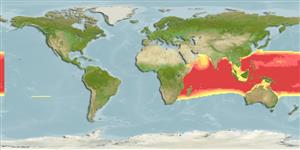Classification / Names
Common names from other countries
Main reference
Size / Weight / Age
Max length : 9.6 cm SL male/unsexed; (Ref. 4496); common length : 7.0 cm SL male/unsexed; (Ref. 2872)
Environment
Marine; brackish; pelagic-oceanic; oceanodromous (Ref. 51243); depth range 0 - 2000 m (Ref. 26165)
Climate / Range
Subtropical, preferred 28°C (Ref. 107945); 25°N - 6°N, 62°E - 100°E
Distribution
Indian Ocean: confirmed from the Arabian Sea and Bay of Bengal. Reports from outside this area are most likely misidentifications (A.S. Harold, pers. comm., 18/08/98) and name reported from western Pacific may be a misidentification of B. pseudolanceolatus (Ref. 114229).
Countries | FAO areas | Ecosystems | Occurrences | Introductions
Short description
Dorsal
spines
(total): 0;
Dorsal
soft rays
(total): 57-66;
Anal
spines: 0;
Anal
soft rays: 58 - 69;
Vertebrae: 52 - 58. Body is elongate, brownish and with speckling above and silvery below. The cheek and lower head also silver. Single occipital ray long and delicate, extending to near the middle of the second dorsal fin (Ref. 46075). Pelvic fins are jugular.
IUCN Red List Status (Ref. 115185)
Threat to humans
Harmless
Human uses
Fisheries: commercial
More information
ReferencesAquacultureAquaculture profileStrainsGeneticsAllele frequenciesHeritabilityDiseasesProcessingMass conversion
Tools
Special reports
Download XML
Internet sources
Estimates of some properties based on models
Phylogenetic diversity index
PD50 = 0.5001 many relatives (e.g. carps) 0.5 - 2.0 few relatives (e.g. lungfishes)
Trophic Level
3.3 ±0.42 se; Based on food items.
Resilience
High, minimum population doubling time less than 15 months (Assuming tm=1)
Vulnerability
Low vulnerability (10 of 100)
Price category
